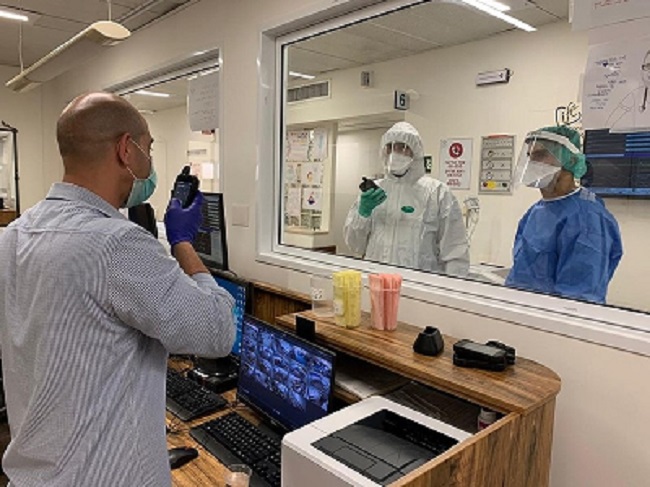David Cronin
The Electronic Intifada / April 11, 2020
Soap and water are more important than bombs and bullets. Medics are being applauded more than military generals. Masks are proving to be of greater value than missiles.
Based on those realities, the world’s weapons makers ought to be going through a rotten time right now. Their main products are frankly useless for fighting a virus.
That, of course, is not the message they would like to convey. Elbit, Israel’s top arms exporter, is busily promoting how its innovations can benefit health care.
Elbit claims to have developed a “remote coronavirus testing system.” Using a radar, it can apparently measure the temperatures and heartbeats of patients without actually touching them.
As if that wasn’t sufficiently exciting, Elbit has also provided doctors in Israel with a new mobile phone app. It has been designed to make communications easier in a noisy environment – or at least that’s what I gleaned while trying to digest all the fancy words pumped out by Elbit’s press team.
Abandoning war ?
Sadly, there are no hints that Elbit is abandoning the business of war.
Last month Elbit announced that it has a backlog in orders worth more than $10 billion.
Demand for Israeli weapons has never been higher. Data compiled by the Stockholm International Peace Research Institute suggests that Israel’s arms exports grew by 77 percent in the 2015 to 2019 period, when compared with the period between 2010 and 2014.
The chronology is instructive.
By bombarding Gaza constantly in the summer of 2014, Israel gave its weapons makers a major opportunity to showcase new products. An Elbit drone, the Hermes-900, made its “combat debut” at that time.
The subsequent rise in exports cannot be divorced from that offensive. Elbit and other Israeli firms have turned the slaughter of Palestinians into marketing opportunities.
The clue is that Elbit’s promotional material refers to weapons being “battle proven.”
Wanton destruction
The 2014 attack involved the wanton destruction of health facilities. Eleven ambulance drivers and civil defense workers were killed.
Elbit’s work on COVID-19 does not erase the fact it profited from a military operation in which medics were deliberately targeted.
As a leading supplier of drones to the Israeli military, Elbit directly enabled crimes against humanity. The drones were deployed for hideous purposes like “roof-knocking” – dropping a missile on residential buildings as a precursor to deadlier attacks.
Elbit might now be posing as a manufacturer of medical technology. But that does not alter how it has made cluster bombs – such ghastly weapons that most countries in the world have signed an agreement to ban them.
It is perhaps unnecessary to add that Israel has rejected that agreement. Israel sprayed a part of Lebanon with cluster bombs while attacking that country in 2006.
Elbit and its subsidiaries have installed surveillance equipment in the wall Israel has built in the occupied West Bank – a wall declared illegal by the International Court of Justice.
Elbit has similarly assisted the militarization of the US border with Mexico.
Further opportunities will arise if the European Union continues behaving in a cruel manner to refugees. Israel’s defense ministry has signaled that it regards milking those opportunities as a priority.
The lessons that need to be learned from the COVID-19 pandemic are becoming all too clear.
Slashing health budgets – something that has occurred in many countries – can have devastating repercussions.
If political leaders are to be prepared for future emergencies, then it is vital they take a different approach. It is vital, first and foremost, to treat medical care as a right, not a commodity.
It is equally vital to dramatically reduce military expenditure and instead invest more in medicine and education.
With political leaders in hock to right-wing ideologues, a change of direction looks unlikely. That doesn’t mean we shouldn’t organize to demand it.
For too long, numerous politicians have admired how Israel has milked the opportunities afforded by a military occupation to build an extremely lucrative weapons industry.
Firms like Elbit might be able to congratulate themselves for making a small contribution toward ending a pandemic – if that is indeed what they are doing. That small contribution should not conceal how all the deals which Elbit has clinched are stained with Palestinian blood.
David Cronin is an associate editor of The Electronic Intifada; his books include Balfour’s Shadow: A Century of British Support for Zionism and Israel and Europe’s Alliance with Israel: Aiding the Occupation













